I took a two-day leave from Paris and drove to Brussels and Rotterdam for a total of 4 days and 3 nights. I attended two concerts where Yuja Wang and Tarmo collaborated, and I had quite a few experiences.
Over the four days, excluding meals, I spent a total of 610 euros, which was a bit expensive, but considering it was my first solo road trip across three countries, the overall experience was quite good. The total distance I drove was 1,100 kilometers (including 110 euros for fuel, 240 euros for car rental with full insurance, 90 euros for two concert tickets, and 180 euros for three nights of accommodation).
Concerts
- Yuja's live performance skills are truly amazing. During the first concert in Brussels, she encored with two familiar but complex pieces (one is Carmen Variations), while in Rotterdam, she encored with a more "worldly" piece, I am so familiar with that piece but I don’t know the name, and Tarmo, despite being young, is exceptionally skilled in playing music.
- My only regret is that I don't know much about Bartók, so I couldn't fully understand the meaning and background of his concerto.
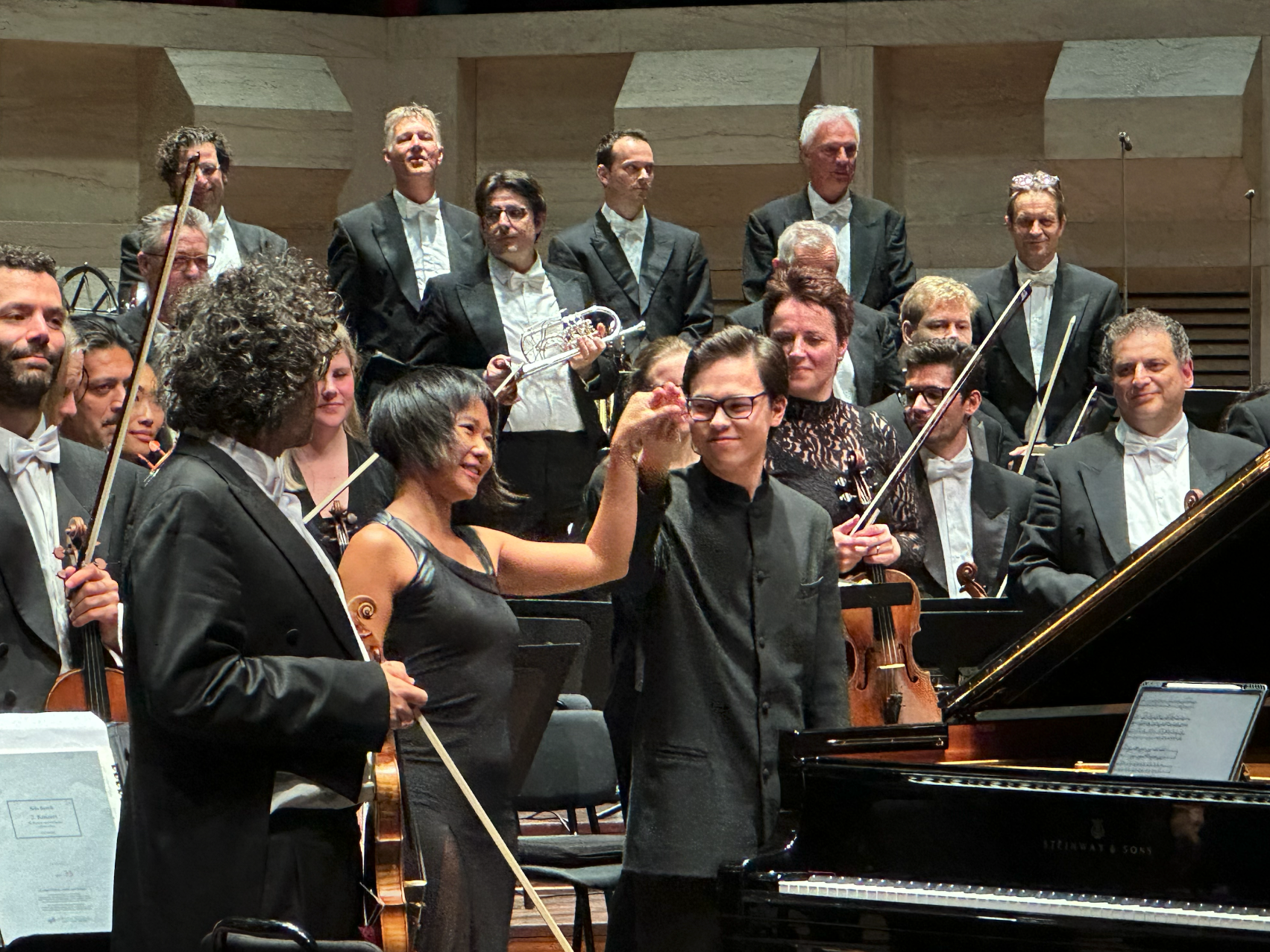
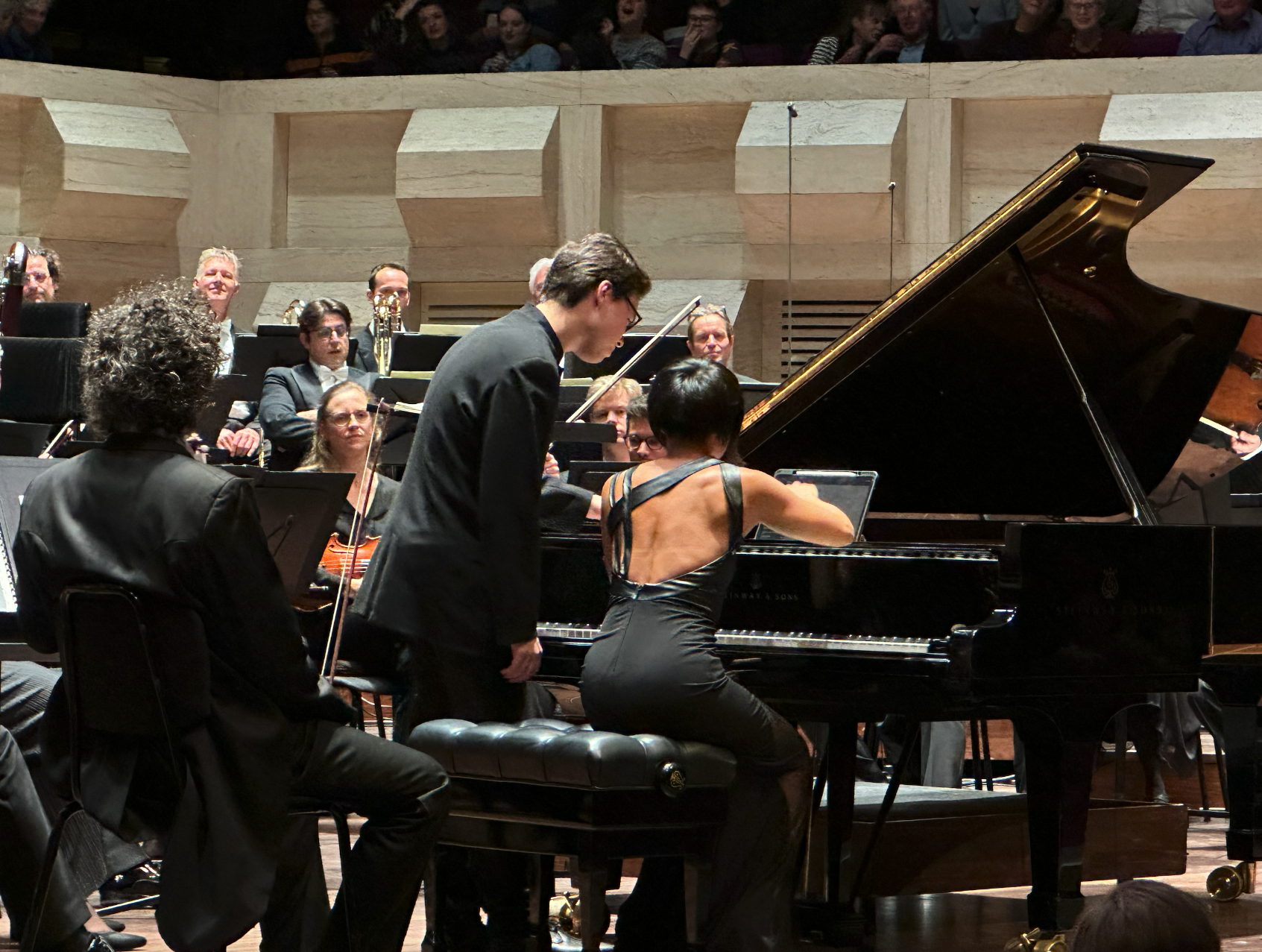
- During the concert in Rotterdam, I could have "intruded" backstage during intermission to get a photo with Yuja, but I lacked the courage. I've always been risk-averse since childhood because my parents used to say, "We don't want you to be extremely wealthy; we just want you to be safe." This instilled a sense of prudence in me. Of course, the Chinese government also values stability, and stability is more important than fairness and justice in our country. But Jewish education is quite the opposite; they encourage their children to take risks. For example, if they don't start their own companies, they shouldn't come back home. As I grew older, I found that I preferred the excitement of risk when I saw less hope.
Driving
- Renting a car was relatively easy. Remember to buy full coverage insurance. I rented a SUV from Hertz, a Citroën, but unfortunately, no matter how hard I accelerated, I couldn't reach 180 kilometers per hour; the maximum was 178.
- On the morning of November 2, while driving from Paris to Brussels, there was a strong wind, and I could feel the car swaying. Even at a speed of 120 kilometers per hour on the highway, it felt uncontrollable. This was the first time in my life that I encountered such a dangerous situation. At that moment, I was driving steadily in the middle lane. I saw a tree branch by the roadside being blown off by the wind, and it was about to fall just a few meters in front of my car. I remained calm and instinctively checked the left side mirror to ensure no other cars were there. Then I turned the steering wheel to the left about 20 degrees and simultaneously decelerated (a small tip: in such situations, it's highly likely you should decelerate rather than accelerate, because accelerating from 120 to 160 may take 20 seconds, but slowing down from 120 to 80 might only take 1.5 seconds). My car then gently grazed the tip of the branch at a speed of about 60 kilometers per hour. Fortunately, I didn't accelerate; otherwise, the branch would have hit the roof of my car. Judging by the thickest part of the branch, about 20 centimeters, my car's roof would not have survived. If I had not changed lanes but only decelerated, the front of my car would likely have been severely damaged. If I had not decelerated or changed lanes, the branch would probably have shattered the car's windshield. Overall, I think my reaction was quite impressive. It was the first time in my life that I had encountered such a situation. After the branch hit the roof, I immediately checked the right side mirror, confirmed there were no cars on the right, and turned the steering wheel to the right to pull over to the emergency lane. I turned on the hazard lights and, after ensuring there were no cars behind me, got out of the car to inspect the damage. Fortunately, there was only a dent and a few scratches on the car, so it was not a big deal. After I stopped, a Frenchman parked next to me and asked if everything was okay. I was very grateful for his concern. You can see the pictures below:
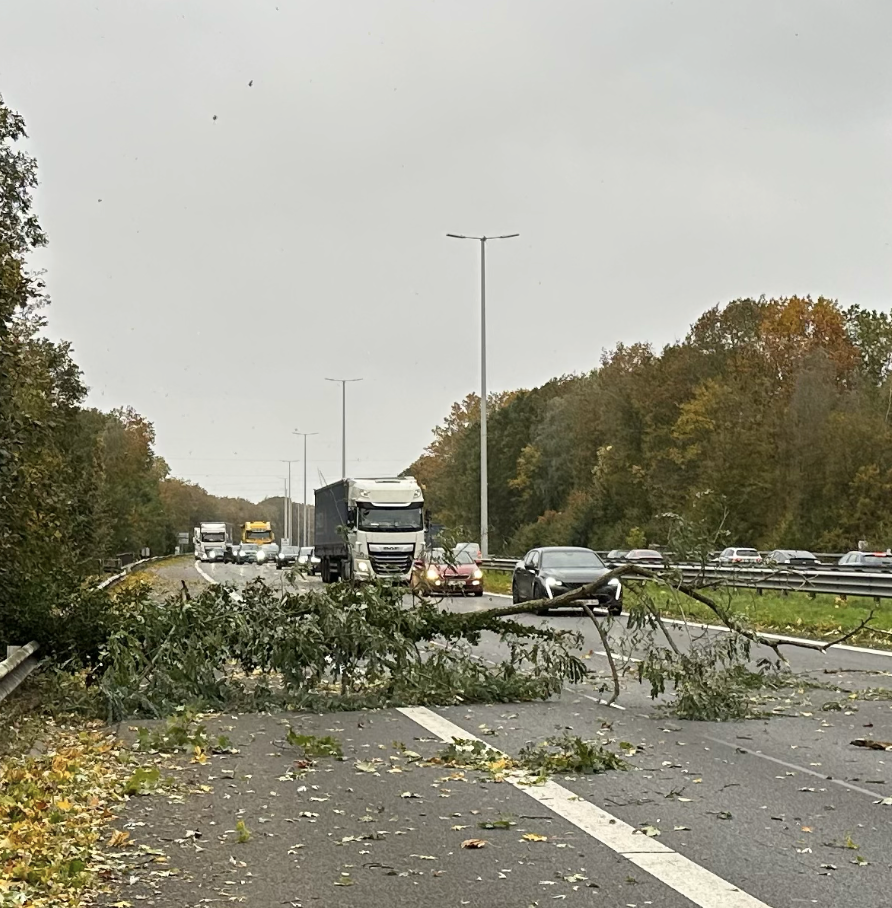
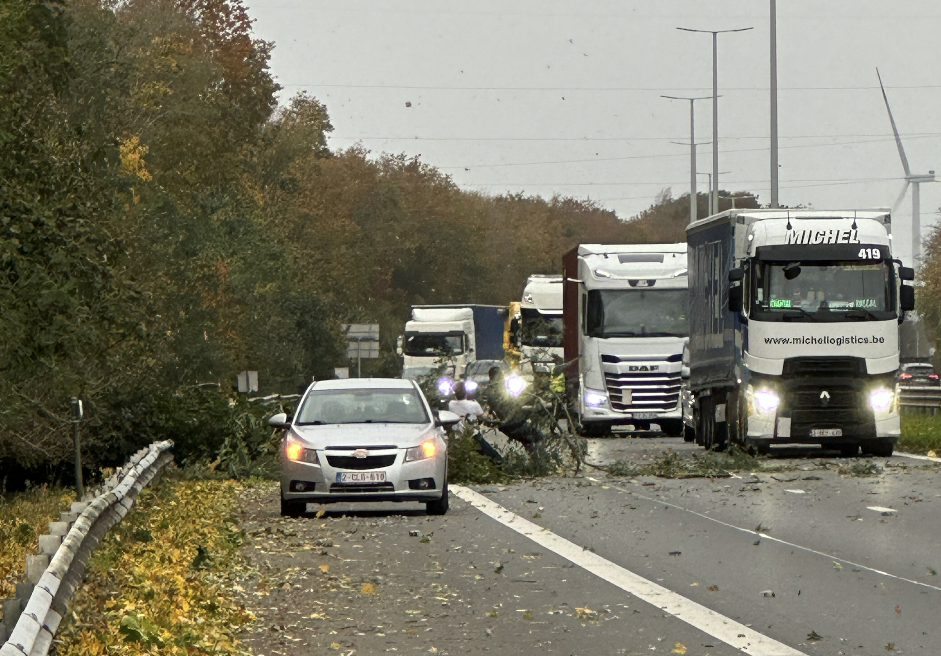
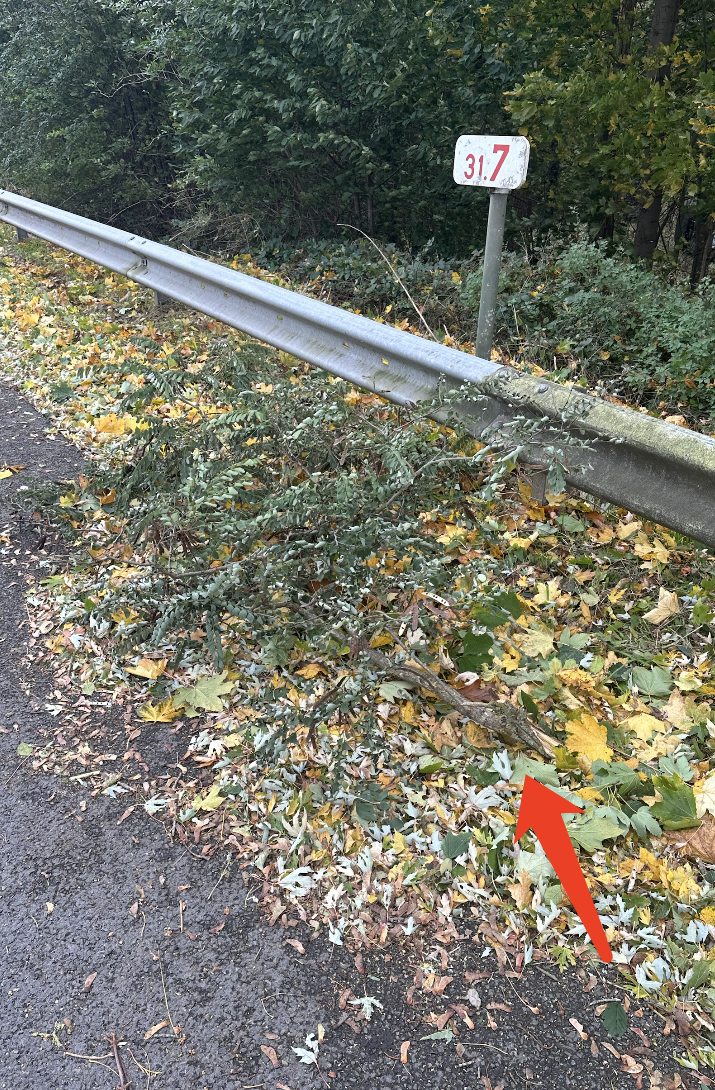
- The interior of this Citroën SUV was decent, but I was unimpressed with its performance. It was definitely inferior to German cars. I conducted some tests for fun: it took 12 seconds to accelerate from 45 kilometers per hour to 100 kilometers per hour in 4th gear, 10 seconds to accelerate from 30 kilometers per hour to 80 kilometers per hour in 3rd gear, and 6 seconds to decelerate from 120 kilometers per hour to 0, but not a full emergency stop. At around 60 kilometers per hour, the car swayed about 30 degrees, and at 100 kilometers per hour, it swayed about 10 degrees, giving me a sense that it was about to lose control.
- Parking was a big issue in Western European countries, especially in city centers. If you prefer stability, it's essential to book parking in advance (yes, you heard right, reserve a parking spot online in advance). Parking in the old town area of Brussels cost 11 euros per day, which was already cheap by comparison. Rotterdam was more expensive, but I rented a parking spot in the suburbs at Interparking for 7 euros per day. If you don't book online, the daily maximum is 9 euros. When I entered the parking lot, I couldn't figure out how to use the reservation code, so I essentially wasted 7 euros. But fortunately, when I tried to pay with my credit card upon exiting the lot after two days, it didn't work. A nearby gentleman came to help me solve the issue, and the office eventually allowed me to leave without any charges. Quite lucky, I must say.
Brussels
- I was unsure how this country made its money. It seemed I didn't do enough research. I stayed in the city center, which made parking very challenging. The garage door of the parking facility I rented was one of the narrowest I've encountered in my life. Moreover, the entire city had no traffic lights except on the main roads, and it was all one-way streets. Without Google Maps, I would have been lost. However, the small circle where I stayed was equivalent to the old town area, while the more modern and advanced parts were in the east, hosting various international organizations, the EU headquarters, Google Office, and more. It was very modern.
- What does Belgium rely on for income? In recent history, the automobile industry was a pillar industry, with Belgian car brands established two years earlier than BMW. Belgium was also one of the earliest countries to build railways and was a major car manufacturing nation, second only to France and Germany in volume at that time. Currently, Belgium relies on industry and the port of Antwerp for income. Specifically, the petrochemical industry is the primary industrial sector, centered around the port of Antwerp, which is the world's second-largest petrochemical industrial cluster. It mainly deals with crude oil and refined petroleum products and other industrial goods, reducing costs through port throughput. Additionally, Antwerp is also the world's largest diamond trading and processing hub, with a daily jewelry trade turnover of approximately 150 million euros and an annual turnover of around 45 billion euros. Since the 19th century, Antwerp has been a renowned diamond processing and trading location, and seven out of every ten diamonds in the world are processed here (although diamonds are not as valuable nowadays). Finance is also one of the pillars (Luxembourg is known for pure finance in the east, and the Netherlands is known for pure logistics and trade in the north). When French President Hollande came to power and threatened to impose a 75% tax on the wealthy, many wealthy individuals threatened him back to emigrate to Belgium.
- Similarly, the arts are impressive here, although there are fewer pianists and violinists compared to Central and Eastern Europe, including Russia.
- In the city center of Brussels, there is an old bookstore that sells various old items, such as old games, books, CDs, and even old adult CDs, haha. I spent a long time there and bought two French books on European history, which only cost me 5 euros in total. It was really cheap. The store is called "Pelemele."
Rotterdam
- In Rotterdam, I did two things: attended Yuja's concert (I was in the front row haha) and met up with friends.
- The Netherlands' protection of employees is worth studying for France (although France is not that bad).
- People are very friendly, much friendlier than in Paris.
- It rained lightly the second day I was there.
- Like Amsterdam, the entire city is very modern and stylish, but I couldn't find an old bookstore.
Some Coastal Peninsulas and Islands in the Netherlands
- It's very windy by the seaside, and the air is filled with sand.
- There are many windmills, and wind power is abundant. Occasionally, you can see nearby residents stopping their cars on the side of the road to walk their dogs.
- Many seaside and coastal cottages have large windows, and you can see scenes of elderly ladies sipping tea and reading newspapers inside. It's very cozy but also somewhat lonely.
Others
Near the open market in Bakkt in Rotterdam on the Saturday, I saw some old stamp collections that people had gathered in the past. However, what's important is that the cover of one of those stamp albums had the word "Nederland" written on it. I had always wondered where the name "Nederland," which is the Dutch name for the Netherlands, originated. It seems it comes from here. In English, the Netherlands is "Netherland," and I had been pondering why the "d" was changed to "th" in English. Later, I couldn't figure it out, but I believe it was certainly influenced by Spanish because in Spanish, "d" actually makes the same sound as "th" in English (while Spanish "t" sounds like English "d"). The name "Netherland" in many languages means "low land," such as "pais bajo" in Spanish, "pays bas" in French, and in English, it could be called "low land" as well. So why does it have the name "Netherland" or "Nederland"? After researching, I found that in Dutch, "neder" is equivalent to Middle English "nether," which means "low." This explanation makes sense.
